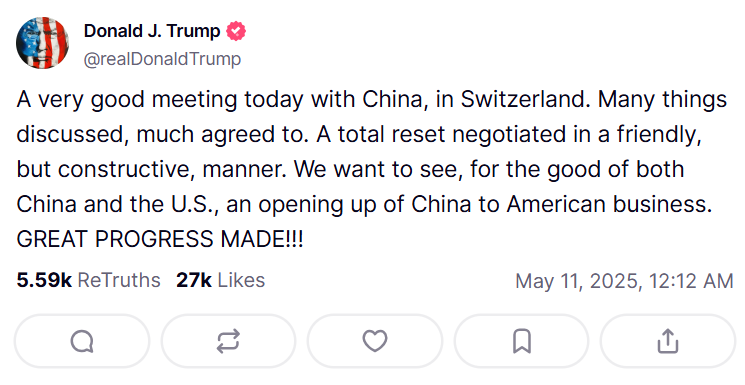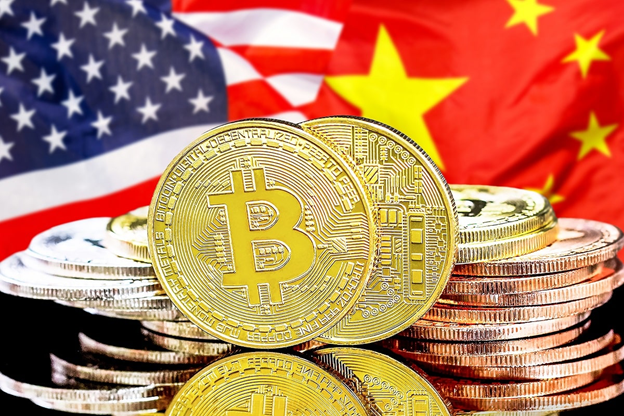TLDR
- US and China reached a deal to temporarily reduce tariffs for 90 days while negotiations continue
- US will cut tariffs on Chinese imports from 145% to 30%; China will reduce tariffs on US goods from 125% to 10%
- Treasury Secretary Scott Bessent stated “neither side wanted a decoupling”
- Officials discussed US demands for China to crack down on fentanyl-related chemicals
- Global markets responded positively with Hong Kong’s benchmark index and S&P 500 futures both surging about 3%
The United States and China have reached an agreement to temporarily reduce the tariffs they imposed on each other, marking a pause in the escalating trade war between the world’s two largest economies. The deal, announced on Monday, will suspend the countries’ respective tariffs for 90 days while they continue negotiations on a more permanent solution.
BREAKING: U.S. Announces China Trade Deal in Geneva pic.twitter.com/JjgvYAvAGe
— The White House (@WhiteHouse) May 11, 2025
Under the agreement, the United States will reduce its tariff on Chinese imports from 145% to 30%, while China will lower its import duty on American goods from 125% to 10%. This represents a major de-escalation in the trade tensions that have recently threatened global economic stability.
Treasury Secretary Scott Bessent, speaking at a news conference in Geneva following weekend talks, emphasized the shared interests of both nations. “The consensus from both delegations is that neither side wanted a decoupling,” Bessent said.
The agreement breaks an impasse that had effectively halted trade between China and the United States. Many American businesses had suspended orders from China, hoping for reduced tariff rates while preparing for potential price increases.
Chinese factories had experienced a sharp decline in export orders to the United States. This put additional pressure on China’s already sluggish economy.
Market Response and Ongoing Concerns
Financial markets responded positively to the announcement. Hong Kong’s benchmark index surged about 3%, matching the increase in S&P 500 stock futures. This suggests investors view the temporary truce as a positive development for global trade.
The negotiations also addressed U.S. demands for Beijing to take stronger action against the trafficking of chemical ingredients used to manufacture fentanyl. Bessent indicated that Chinese officials “understood the magnitude” of the fentanyl crisis in the United States.
President Donald Trump initially added a 20% tariff on Chinese exports, accusing China of insufficient efforts to stop the flow of fentanyl to the United States. According to U.S. officials, this punitive tariff remains in place despite the broader tariff reductions.
The high-stakes talks in Switzerland came amid widespread economic uncertainty stemming from the trade war. The standoff had roiled financial markets and sparked concerns about reduced availability of goods and rising prices for consumers.
U.S. Trade Representative Jamieson Greer described the negotiations as being characterized by “mutual understanding and mutual respect.” However, he noted that China was the only country to retaliate against the United States after President Trump imposed what he called “reciprocal tariffs” on dozens of countries last month.
The White House had initially announced the “trade deal” on Sunday without providing specifics. Bessent described the weekend trade talks as “productive” and promised more details in a complete briefing scheduled for Monday morning.
Bessent also mentioned that both he and U.S. Trade Representative Greer spoke with President Trump on Saturday evening, stating that the president was “fully informed” about the discussions.
Chinese officials also spoke positively about the outcome. Vice Premier He Lifeng said the meeting “achieved substantial progress and reached important consensus.” The two sides agreed to establish a consultation mechanism for trade and economic issues.
China International Trade Representative Li Chenggang suggested that a detailed statement would be forthcoming. “I think no matter when this statement is released, it’s going to be big news. Good news for the world,” Chenggang said.
President Trump had previously expressed optimism about the talks, writing on Truth Social after the first day of discussions that U.S. officials had a “very good meeting today with China.” He described the negotiations as “a total reset negotiated in a friendly, but constructive, manner.”

The temporary tariff reduction agreement comes after Trump announced 145% tariffs on Beijing on April 2. China had responded by raising its levies on U.S. goods to 125%, creating a cycle of retaliatory measures that threatened global trade.






